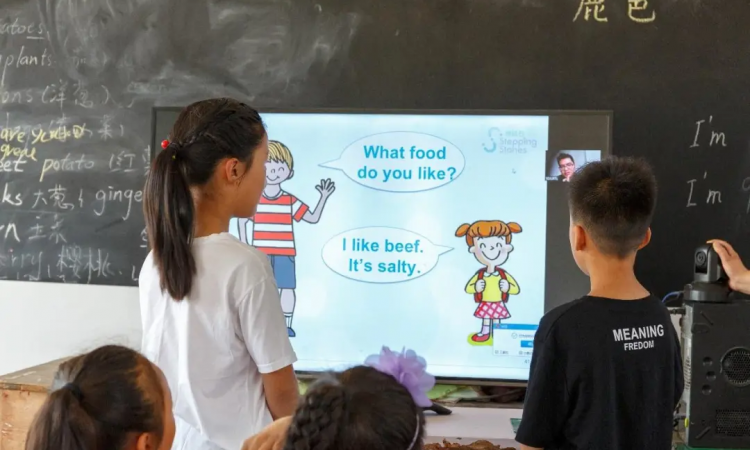During the spring, many of my friends are busy going out and appreciating the lovely weather. However, Claire, Stepping Stones’ volunteer trainer, was immune to the spring flowers outside the window and was busy in a pile of handicrafts.
The newly-arrived editor couldn’t help but wonder, “Is this still a child, playing so happily?””We are thinking up a new educational game to help children to learn English,” Claire answered.”This is a new English course for rural children, right? What are the features of this course?” the editor continued to ask. Once Claire, who has been teaching for more than ten years, got started on this topic, she could hardly stop!
Children in rural schools in remote areas lack the environment and opportunity to practice oral English, and they are unable to apply the vocabulary and grammar they have learned to actual communication, which leads to low efficiency of English learning and low confidence in using English, and further reduces their interest in learning English.
Stepping Stones’ English class aims to resolve the problem that rural students lack interest in learning English and cannot express themselves confidently. By creating a context, students no longer learn vocabulary and grammar in isolation, but are given a series of activities or tasks that require English communication, allowing them learn and practice English naturally. Creating a high degree of relevance to students’ life can help children learn English better. When they need to express themselves, they will have the English skills close to hand.

Stepping Stones’ English class gives children the opportunity to learn English efficiently and in a fun way, and at the same time, it is also a window for the children to learn more about faraway places. We have an excellent team of Chinese and foreign volunteers, including professional English teachers. Through our volunteers, students learn about different lives, as well as about things that are the same in other parts of the world.
Through the classes, students generally become more interested in learning English, express themselves more confidently and fluently in English, and improve their English scores.

After listening to all this, the editor could not help but give a thumbs up, “This is really great! Giving the rural children one lesson a week, and achieving a very good impact on their learning, that’s amazing. It must be a lot of work, Claire.”
Claire was a little embarrassed, and responded: the work load is indeed quite high, but I’m not the only one who is busy, our whole volunteer team works very hard to provide Stepping Stones’ English course to more children for free. We feel so happy when we see the children’s smiling faces as they look forward to our lessons, and don’t feel tired any more.”
The editor began to marvel, such a good course is provided for free?
“That’s right. All these free lessons to children in rural areas are funded by our generous donors.” Claire smiled.
“How much money do I need to donate?” the editor enquired. “For just 21.5 yuan a month over a total of 12 months, you can give a village child the chance to join Stepping Stones’ English course for a whole school year.” The editor quietly put down her cup of coffee. She suddenly realized that for the cost of just one cup of coffee or milk tea every month, she could help one child in a remote area with their English studies, helping them to improve their educational opportunities, and giving them a better chance to achieve their dreams, whatever those are.
Stepping Stones’ English class aims to resolve the problem that rural students lack interest in learning English and cannot express themselves confidently. By creating a context, students no longer learn vocabulary and grammar in isolation, but are given a series of activities or tasks that require English communication, allowing them learn and practice English naturally. Creating a high degree of relevance to students’ life can help children learn English better. When they need to express themselves, they will have the English skills close to hand.



